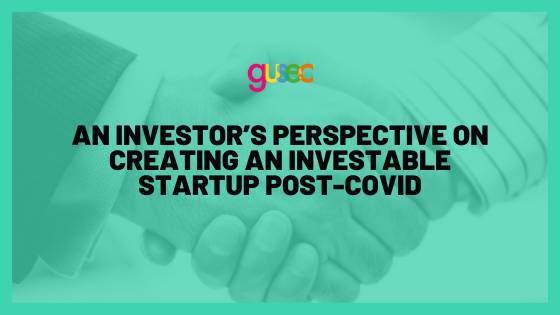An Investor’s Perspective on Creating an Investable Startup post-COVID

In a session organised by GUSEC, hosted with Dheeraj Bhojwani, CEO of AIC-GUSEC & Piyalee Chattopadhyay, TiE Ahmedabad, Angel Investor Sushanto Mitra mulls over strategies for survival and growth for startups. Here are some highlights from the session.
A Great Time to Experiment
- What would you advise someone who’s about to get into entrepreneurship or about to start their fundraising?
- This time is a great opportunity for people who are still planning to start a career as entrepreneurs because they have the opportunity to conceive what the world will be post-COVID and what are the areas where things are changing. It’s also a good time because people, intern, co-founders, a lot of talent is available. People are working from home, and are willing to experiment.
Customers are looking for ways to save money. If you have someone that helps people save something ‘sasta, sundar and tikau’ means, can you give them a more economical product, people are willing to experiment and will be interested in your offering.
- What do you say to companies that are not yet funded and were in the middle of or yet to raise their rounds of investments?
- Startups need to extend their runway as much as possible, reserve their cash. One way to extend your runway is to pivot. Sushanto gives various instances of companies he worked with who pivoted from their principal business, extended their runway, and successfully maintained a steady cash inflow.
Growth or Sustenance?
Q. Given the current scenario of COVID, should startups focus more on growing or just figure out ways to sustain themselves?
A. Startups should focus on sustaining themselves for now. It will be hard to raise money amid the lockdown, and in a couple of months when the hysteria surrounding the pandemic subsides, the demand will become clearer and help startups make better decisions.
Q. There are different recovery paths for different businesses. Any suggestions for them?
A. This is the time to rebuild your product, develop more features for your product, including market segments that you haven’t addressed so far. Swiggy is doing groceries. Grocery stores are doing pharmaceuticals. Everyone is addressing the needs of their customers in sectors that they hadn’t before. A lot of new revenue streams can be developed due to the abundance of time at the moment.
Q. Any HR best practices in the sense that teams are not meeting during the WFH schedules?
A. People need to be motivated much more. They should communicate more. Even if you have to let people go, counseling them and helping them land their next job opportunity can go a long way. Most companies are avoiding layoffs and taking salary cuts. This is not a time to be brave, especially for young startups. This is the time to conserve your capital. By not laying off people you’re jeopardising the jobs of other people.
Sought-After Startup Sectors amid the Pandemic
Q. What would your suggestions be to startups that are yet to raise funds?
A. For startups in sectors like EdTech, Healthcare, etc, it is actually a great time to raise money. Some companies in these sectors are at present seeing a 30-40% growth in their business every week.
Q. What would you suggest companies that are in these sectors, how can they accelerate their growth during this time?
A. Go for an aggressive round of fundraising. Sectors like EdTech, Logistics, and e-commerce, are attracting a lot of attention from investors, and they are witnessing an investor-rush. Hire more salespeople, increase your fund requirement, reach out to more customers, and expand your business operations. For those chosen few startups, go aggressive in the market, this is the best of times for them.
Q. Startups in these areas may also see a lot of opportunities to get acquired and work on other strategic deals from bigger businesses. What is your advice for them?
A. This scenario shall present startups in these sought-after sectors with a dilemma – they may think that they’re just starting to grow and that they may feel it is too soon to get acquired. On the other hand, given the prevailing uncertainty in the market, they may want to seize every opportunity handed to them. Make at least some money, put that in the bank, and then negotiate the rest on the basis of the performance of your company. Cash is king. Founders should make as much cash as they can for their startups, they should bank it rather than waiting to see how it pans out. Don’t let the immediate opportunities go. Partial sell, and balance the rest on future
Q. But is the partial-sell option something that investors are open to considering?
A. Looking at the acquirer perspective, they’re not paying the 100% amount, and the buyer will always be happy to give startups a performance-based exit.
If you have Questions like These:
- Will valuations be hampered in the current scenario?
- Are Angel Investments going to take a hit, and divert investors to primary or secondary markets?
- Effect on International Trade, especially food and exports
- How can consumer startups leverage technology in order to survive and scale?
- How can brick-and-mortar businesses survive the challenges imposed by COVID?
- What will the investment scenarios look like in the coming time?
- Would there be any specific sectors that the investors might favor over others in the next few months?
- How will health & wellness startups, being in the same domain, fare in the future?
- What is the best way to reach out to angels, especially lead angel investors in the coming time?




